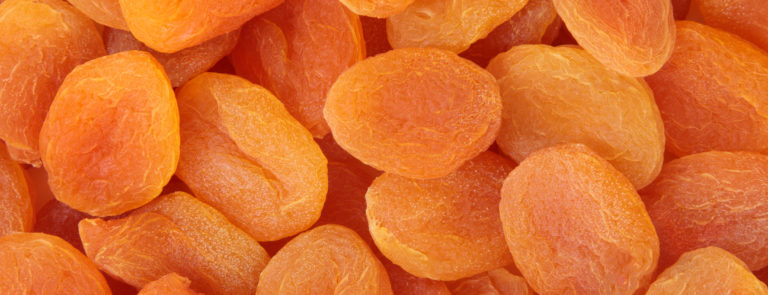15% off €25
10 health benefits of dried apricots

We all know how important it is to include plenty of fruit and vegetables in our diets.
But it can be hard to get the recommended daily amount, especially if you’re always on the go.
Dried fruit might be the answer.
While dried varieties of your favourite fresh fruits have had some negative attention, they can be a nutritious addition to your diet when enjoyed in moderation.
They’re full of healthy nutrients and are handy to carry with you when you’re out and about.1
Dried apricots are often a favourite when it comes to dried fruits.
If you’re wondering what the health benefits of dry apricots are, we’ve got all you need to know below.
In this article, we’ll discuss:
What are dried fruits?
Dried fruits are fruits that have been dehydrated through sun drying or by using specialised dryers to remove most of the water content.
This makes the fruit shrink, leaving it smaller and more energy-dense.
There are a variety of different kinds of dried fruits, with some of the most common being raisins, dates, prunes, figs and apricots.
Is dried fruit good for you?
Dried fruit can be a part of a healthy diet as they are generally high in fibre, antioxidants and vitamin C.2
However, they can be high in natural sugar, both fructose and glucose so it’s important not to overdo it.3
Are apricots good for you?
Yes, apricots are good for you and come with a range of health benefits.
As well as being low in calories, apricots are a great source of antioxidants, including beta carotene, vitamin A, vitamin E and vitamin C.4
Are dried apricots good for you?
So are dried apricots good for you? The answer is, yes!
Dried apricots also contain plenty of essential nutrients, like vitamin C, vitamin A, phosphorus, calcium and potassium. They also include a fair amount of fibre.5
10 benefits of dried apricots
We know they’re good for us, but what are some of the health benefits of dried apricots? We’ve listed the top ten benefits for you below.
-
Improved eye health
In a 100g serving of dried apricots there’s approximately 1280 IU of vitamin A and 1.53mg of vitamin A.6
These nutrients are essential for maintaining eye health.7,8
In particular, vitamin A helps with night vision whereas vitamin E helps to protect the eyes against damage from free radicals.9,10
-
Cell protection
In addition to this, dried apricots also contain a specific type of antioxidant called flavonoids, including chlorogenic acids, catechins and quercetin.7
These are an important component in the neutralisation of free radicals, which can lead to oxidative stress which has been linked to obesity and chronic conditions like heart disease.11,12,13
-
May support immune system
As dried apricots are high in vitamin A, they may could also help with supporting the immune system too.
One research paper studied the link between vitamin A and the immune system which highlighted how vitamin A is known as an anti-inflammatory vitamin because of it’s role in enhancing immune function.14
-
Improved heart health
Another benefit is that dried apricots may be beneficial for heart health. One of the ways in which it supports heart health is through the flavonoids (as mentioned earlier in the article).
But another way that dried apricots help in this area is through the potassium content, as a diet that is low in potassium has been linked to cardiovascular disease.15
-
Better digestion
In just one 100g serving of dried apricots there is approximately 2.6g of fibre.16
A recent study concluded that dietary fibre has the potential to change the gut microbiota as well as being able to alter metabolic regulation.17
-
Reduced risk of diabetes
Remember those flavonoids we’ve mentioned a couple of times in this guide? Well, they’re coming in handy again, this time for diabetes.
One 2019 study stated that flavonoids improve the pathogenesis of diabetes and the complications that come with it by regulating the glucose metabolism, hepatic enzyme activities and a lipid profile.18
-
Improved bone mineral density
Another key nutrient that apricots contain is boron, which may have beneficial effects on bone formation.
In addition to this, a low boron intake reduces calcium and vitamin D levels which can affect bone mineral density.19
-
Supports skin health
Dried apricots are also a good source of beta-carotene, which the body automatically converts into vitamin A (retinol).20
Retinol or retinoids are known to reduce fine lines and wrinkles, which contributes to good skin health and appearance.
-
May reduce blood pressure
Since dried apricots contain potassium, they may be able to reduce blood pressure levels. Studies have shown that potassium could reduce high blood pressure in patients with hypertension (high blood pressure).21
-
Helps to fight anaemia
100g of dried apricots contains 1mg of vitamin C as well as 2.66mg of iron.
The combination of these two nutrients contribute to a higher absorption of iron, which is needed to prevent anemia.22
Calories in dried apricots
In a 28g serving of dried apricots, which equates to roughly eight halves, there is approximately 67 calories.20
Dried apricot nutrition
A 28g serving of dried apricots (approximately 8 halves) typically includes:
| Carbs | Protein | Fat | Sugar | Fibre | Vitamin A | Vitamin C | Calcium | Iron | |
|---|---|---|---|---|---|---|---|---|---|
| Amount | 5g | 1g | trace | 15g | 2g | 20% | 0.5% | 1.2% | 4.2% |
Dried apricots are naturally high in sugar, so try to eat them in moderation.
Despite the fact they have a very low-fat content, your overall calorie intake can become relatively high if you don’t stick to the recommended portion.
How many dried apricots should I eat a day?
While there is no recommended dosage of dried apricots per day, a standard serving is about 8 halves to class as one of your five a day, and it’s best to vary these if you can.25
Are dried apricots suitable for everyone?
On the whole, dried apricots are a nutritious snack that can be enjoyed in moderation by most people.
However, due to the high fibre content, those who have digestive issues may wish to increase the amount of dried apricots slowly as it may cause stomach upset at first.26
Also due to their iron content, dried apricots are recommended during pregnancy and may even be beneficial for the production of red blood cells.
The differences between dried and fresh apricots
The main difference between dried and fresh apricots is the calorie content. A cup of fresh apricots tends to have around 75 calories.
In comparison, the equivalent in the dried variety comes in at 212 calories.27,28
There are some differences in their nutrient profiles too. Because apricots are dried using heat, nutrients like vitamin C are reduced.
However, the fibre content does go up for the dry varieties.29
It can be easy to overeat dried apricots. They’re a lot smaller than their fresh counterparts, and it’s easy to forget that each half is equivalent to half a fresh apricot.
If you’re trying to control lose weight or want to keep an eye on your calorie intake, it might be better to choose fresh fruit. Or, portion out your favourite dried snack instead of eating from the bag.30
Despite this, their nutrient profile can make them an excellent choice for bringing with you on the go. They may be a better choice than other convenient options, like chocolate bars and sweets.
The final say
Dried apricots have a variety of different health benefits, from improved eye health to potentially lowering blood pressure.
That being said, because they’re so tasty they’re easy to overconsume – so try to keep this in mind when you’re snacking on them!
Last updated: 5 October 2021
- https://www.healthline.com/nutrition/apricots-benefits
- https://www.ncbi.nlm.nih.gov/pmc/articles/PMC7554183/
- https://www.ncbi.nlm.nih.gov/pmc/articles/PMC7554183/
- https://fdc.nal.usda.gov/fdc-app.html#/food-details/171697/nutrients
- https://fdc.nal.usda.gov/fdc-app.html#/food-details/173942/nutrients
- https://fdc.nal.usda.gov/fdc-app.html#/food-details/173942/nutrients
- https://www.ncbi.nlm.nih.gov/pmc/articles/PMC3693724/
- https://www.ncbi.nlm.nih.gov/pmc/articles/PMC3880510/
- https://www.ncbi.nlm.nih.gov/pmc/articles/PMC3693724/
- https://www.ncbi.nlm.nih.gov/pmc/articles/PMC3880510/
- https://www.sciencedirect.com/science/article/pii/S1756464615005812
- https://www.ncbi.nlm.nih.gov/pubmed/28620474
- https://www.ncbi.nlm.nih.gov/pubmed/28230726
- https://www.ncbi.nlm.nih.gov/pmc/articles/PMC4307252/
- https://www.ncbi.nlm.nih.gov/pmc/articles/PMC4307252/
- https://www.nih.gov/news-events/nih-research-matters/how-too-little-potassium-may-contribute-cardiovascular-disease
- https://fdc.nal.usda.gov/fdc-app.html#/food-details/173942/nutrients
- https://www.ncbi.nlm.nih.gov/pmc/articles/PMC7146107/
- https://pubmed.ncbi.nlm.nih.gov/31480505/
- https://ods.od.nih.gov/factsheets/Boron-HealthProfessional/#en1
- https://healthfully.com/beta-carotene-while-pregnant-8180880.html
- https://www.ncbi.nlm.nih.gov/pubmed/23558164
- https://www.nhs.uk/conditions/iron-deficiency-anaemia/
- https://www.nutritionix.com/food/dried-apricot
- https://www.nhs.uk/live-well/eat-well/5-a-day-what-counts/
- https://www.ncbi.nlm.nih.gov/pmc/articles/PMC3934501/
- https://fdc.nal.usda.gov/fdc-app.html#/food-details/171697/nutrients
- https://fdc.nal.usda.gov/fdc-app.html#/food-details/173942/nutrients
- https://www.nutritionix.com/food/dried-apricot
- https://www.nytimes.com/2008/07/01/science/01qna.html



